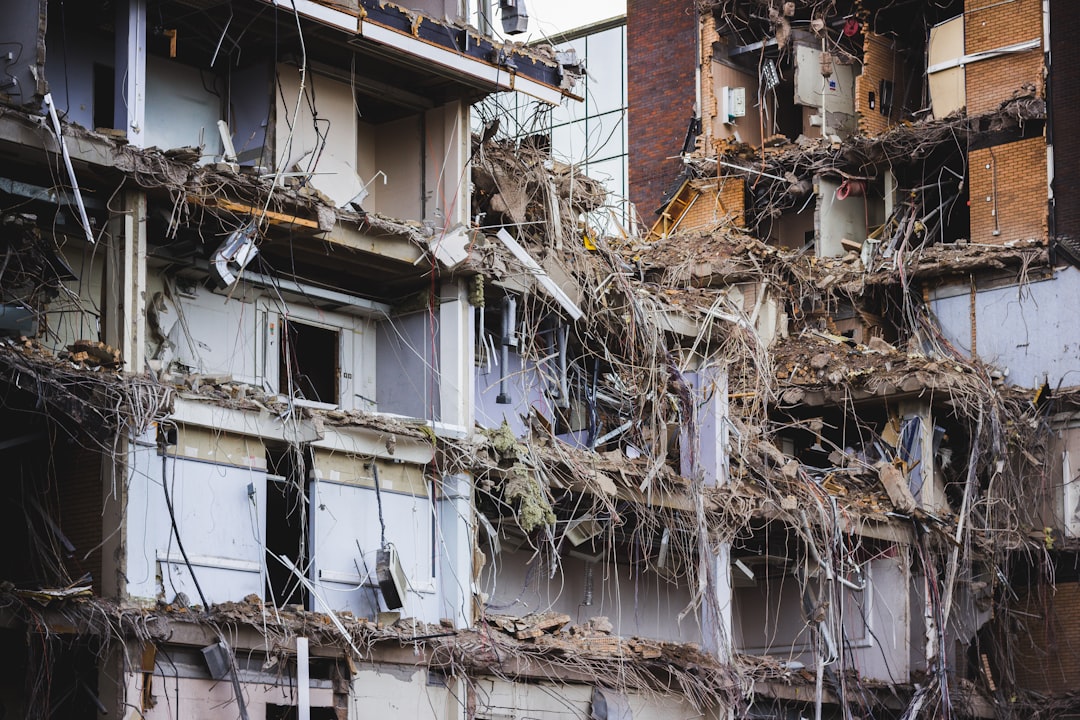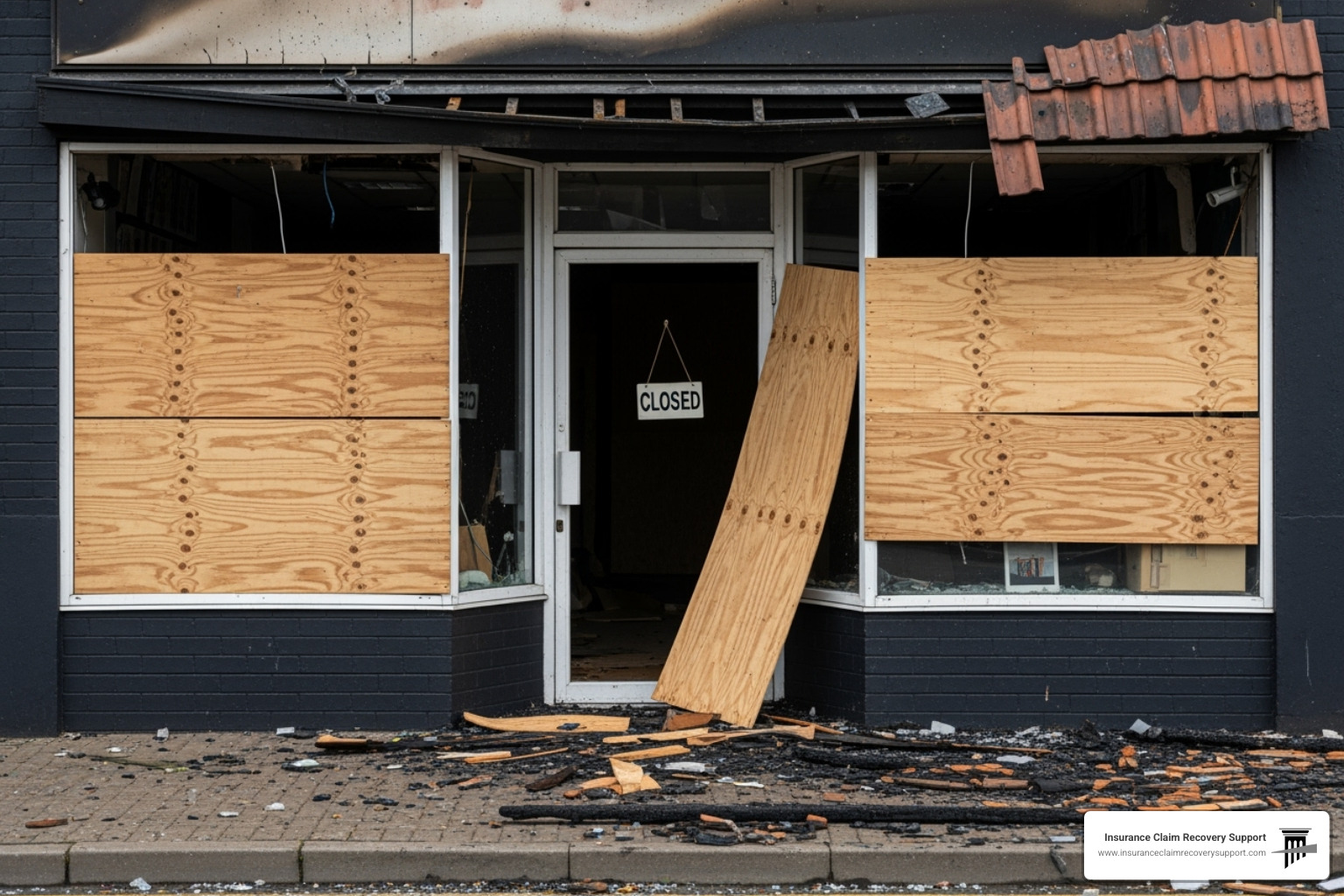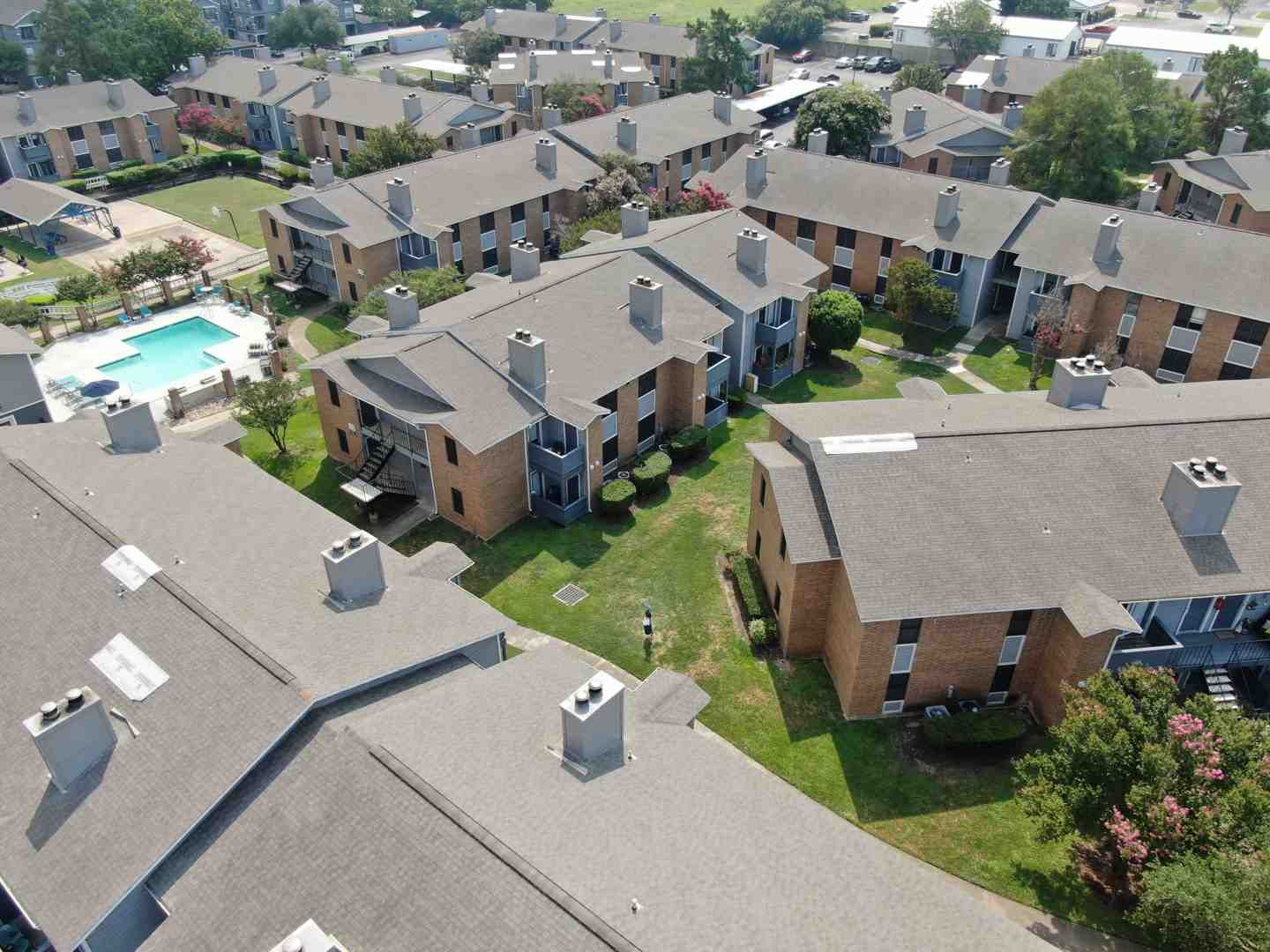Understanding the Complex World of Apartment Property Damage Claims
Apartment Claims involve property damage to multi-unit residential buildings, requiring specialized expertise to steer insurance policies, assess extensive damage, and secure fair settlements for property owners.
Key Types of Apartment Claims:
- Fire and smoke damage – structural damage, contamination, business interruption
- Water damage – burst pipes, appliance failures, mold remediation
- Storm damage – hurricane, tornado, wind, and hail damage
- Liability claims – tenant injuries, property negligence issues
Common Challenges:
- Multiple insurance policies (building, liability, loss of rents)
- Complex damage assessment across multiple units
- Tenant displacement and relocation costs
- Business interruption losses from vacant units
When significant damage occurs, property owners face a critical choice: steer the complex insurance claim process alone or pursue costly litigation. As one Dallas tenant advocate noted, “Most don’t know their rights and what happens is you can easily get bullied…” This dynamic often applies to property owners dealing with insurance companies.
The stakes are high. Unlike single-family homes, apartment buildings involve multiple units, common areas, and complex coverages for the building, loss of rents, and liability. Fire damage alone can result in millions in structural repairs, smoke remediation, and lost rental income. Similarly, water damage from a single burst pipe can spread to multiple floors, leading to extensive restoration work. Without proper expertise, owners often accept settlements that fall far short of actual costs.
I’m Scott Friedson, a multi-state licensed public adjuster and CEO of a large loss public adjusting firm in Austin, Texas. With experience in Apartment Claims, I’ve settled over 500 large loss claims valued at more than $250,000,000, helping apartment owners maximize their settlements and avoid unnecessary litigation.
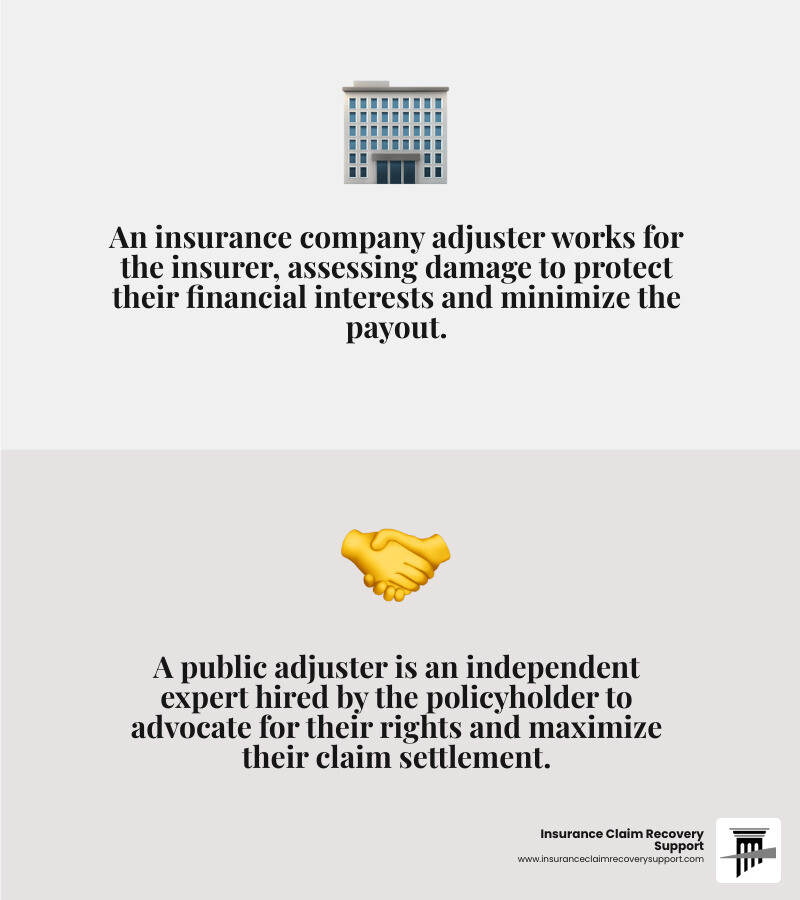
Apartment Claims terms at a glance:
Landlord Responsibilities: The Foundation of Claim and Risk Management
Owning an apartment complex involves serious legal responsibilities that impact your Apartment Claims experience. Your duty of care and the implied warranty of habitability are legal obligations to provide safe, livable conditions. Fulfilling these duties protects your tenants, your financial interests, and strengthens your position in a property damage claim, as insurers will scrutinize your maintenance history.
Understanding Property Maintenance Duties
Property maintenance is an ongoing commitment. Key duties include routine inspections of building systems, ensuring common area safety, and preserving structural integrity. Proactive maintenance schedules for roofs, plumbing, and electrical systems are essential. Common areas like stairwells and parking lots require consistent attention to prevent liability issues.
Your response timeline to tenant repair requests is legally significant. Emergencies affecting health and safety require immediate attention, while less urgent issues may have a 30 to 90-day window. Documenting all communication and work orders is crucial. These records are invaluable when dealing with adjusters. We help owners of Apartment Complexes & Multifamily Townhomes steer these duties during a claim. As Commercial Property Public Insurance Adjusters, we know that proper documentation strengthens your claim.
What Constitutes Landlord Negligence?
Negligence is the failure to exercise reasonable care in property maintenance, leading to harm or damage. Common examples include not fixing known structural issues, ignoring reported safety hazards, or providing inadequate security. What constitutes negligence on the part of a landlord or apartment complex? legally involves four elements: a duty of care, a breach of that duty, causation of harm, and actual damages.
Understanding these elements helps identify risks before they escalate. When negligence leads to property damage, our expertise ensures you receive fair treatment during the claims process. Responsible management not only prevents lawsuits but also smooths the Apartment Claims process, as seen in our work with Homeowner Association Property Damage Insurance Claims.
Common Types of Large-Scale Apartment Property Claims
Large-scale Apartment Claims can create chaos with displaced tenants, emergency repairs, and complex paperwork. Unlike a single-family home, damage in one apartment often cascades into other units, creating a domino effect of disruption.
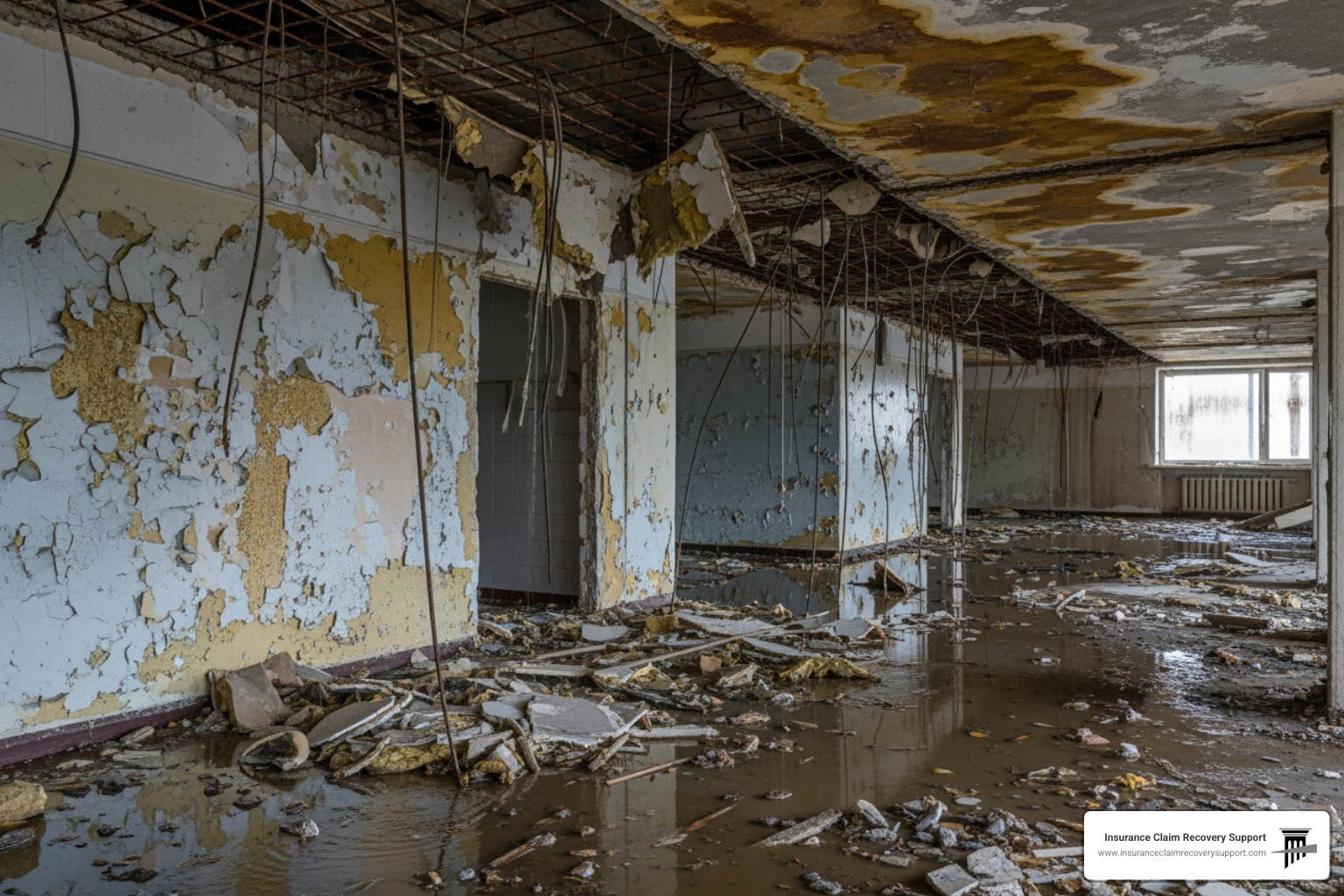
Fire and Smoke Damage Claims
A fire’s destruction extends far beyond visible flames. You face structural damage, widespread soot and smoke contamination that can render undamaged units uninhabitable, and secondary water damage from firefighting efforts. Beyond repairs, business interruption from lost rental income can be financially devastating. These complex scenarios require expert handling of your Fire Insurance Claim. A Public Insurance Claim Adjuster For Fire Damage can mean the difference between a fair settlement and financial disaster.
Water and Flood Damage Claims
Water damage, while common, can be just as destructive as fire. The culprits range from burst pipes and appliance failures to roof leaks and sewage backups, each presenting unique challenges. The hidden danger is mold remediation, an expensive process that can require extensive reconstruction to eliminate health hazards. Immediate action and thorough documentation are critical, making an understanding of a Loss Types: Water Damage Insurance Claim essential.
Storm and Catastrophic Damage Claims
Texas weather brings a full menu of natural disasters. Hurricane damage combines high winds and flooding, while tornado damage can level entire complexes, requiring a complete rebuild.
Even severe thunderstorms can cause significant wind damage across multiple units. These catastrophic events require specialized knowledge. Whether you’re facing Texas Storm Damage, navigating the Hurricane Insurance Claim Process, or filing a Texas Tornado Damage Insurance Claim, expert guidance is key to a full recovery.
The Standard Process for Filing Apartment Claims
When disaster strikes, the process for filing Apartment Claims seems straightforward but is filled with pitfalls that insurers can use against you. Your actions in the first few hours are critical to your final settlement.
Essential Documents for Your Claim:
- Photos and videos of all damage
- Multiple contractor repair estimates
- Maintenance records and communication logs
- Proof of loss forms and lease agreements
- Financial records showing lost rental income
The Initial Steps in Filing Apartment Claims
After ensuring tenant safety, the claim process begins.
- Notify your insurer immediately: Delays can give insurers a reason to deny coverage.
- Mitigate further damage: Board up windows or tarp roofs, but be sure to document all efforts and seek insurer approval for costs.
- Conduct an initial damage assessment: Take extensive photos and videos of everything, no matter how minor it seems.
- Review your policy: Understand your coverage, deductibles, and requirements before the adjuster arrives to strengthen your negotiating position.
Navigating these early stages is crucial. We outline these principles in our guide on How to Steer Commercial Property Claims in 5 Easy Steps.
Essential Documentation for Your Claim
A strong Apartment Claims settlement depends on complete documentation. Insurers often count on incomplete claims to justify lower payouts.
- Photos and videos: Provide comprehensive, time-stamped visual evidence of the damage.
- Repair estimates: Obtain multiple, detailed bids from qualified contractors as required by your policy.
- Maintenance records: Prove you were a responsible property owner and establish the property’s pre-loss condition.
- Communication logs: Keep a detailed paper trail of all interactions with your insurance company.
- Financial records: Substantiate business interruption losses, including lost rent and tenant relocation costs.
Properly documenting a complex claim is challenging, which is why many owners accept inadequate settlements. Understanding key terms from our Glossary of Property Insurance Claim Terms can help.
Navigating Complex Apartment Claims: Public Adjuster vs. Insurance Claim Lawsuit
When damage occurs, many property owners find their insurers use delay, deny, and dispute tactics to minimize payouts. This leaves you facing an inadequate settlement or costly litigation. A third, more effective path is working with a public adjuster.
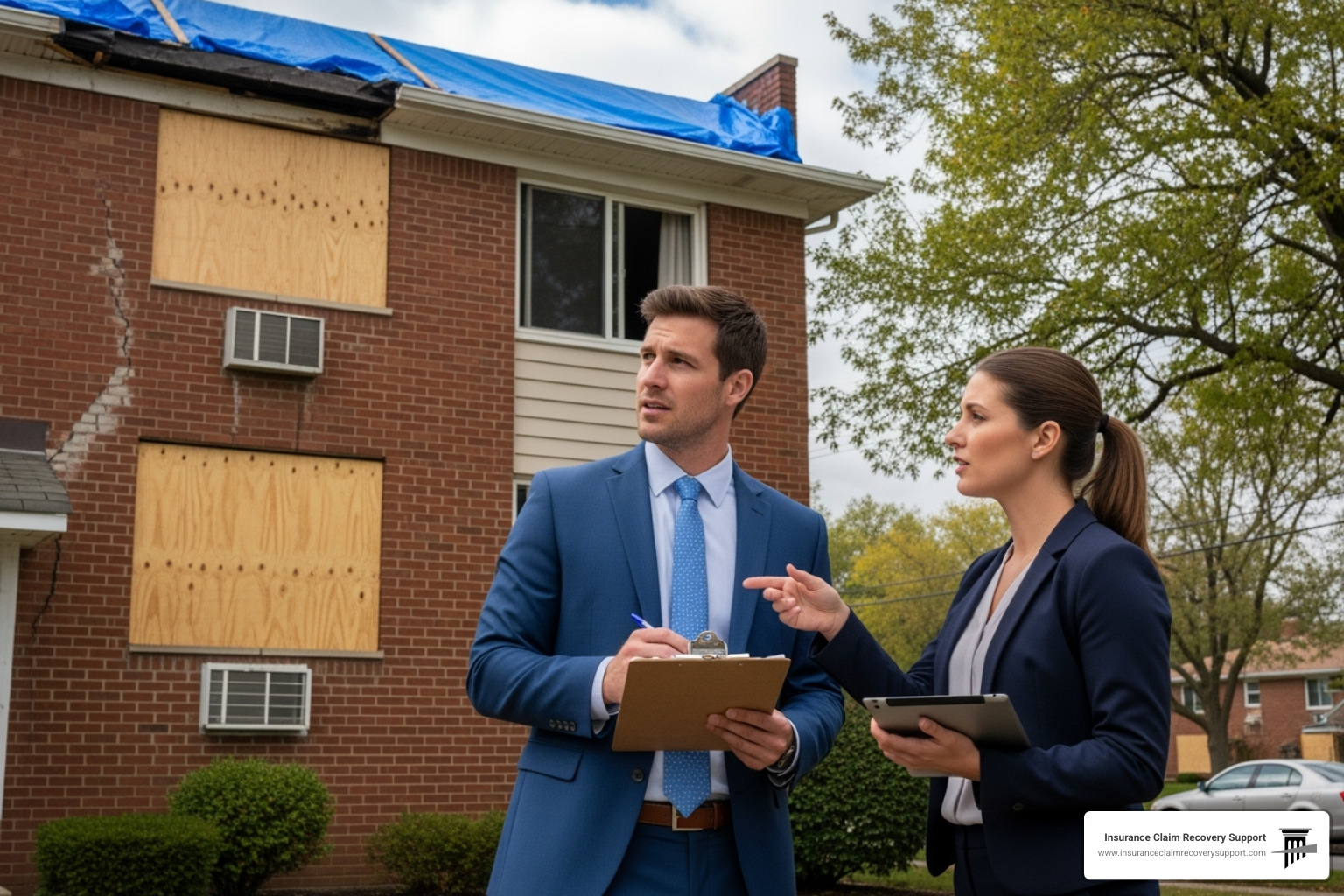
When the Insurance Company Underpays or Denies
It is common for insurers to offer settlements that barely cover half your losses or deny claims based on questionable policy interpretations. As profit-driven businesses, minimizing payouts is part of their model. Common tactics include:
- Disputed damage scope: Blaming damage on pre-existing wear and tear.
- Bad faith tactics: Unreasonable delays or misrepresenting your policy.
- Lowball settlement offers: Providing offers that don’t cover actual repair costs.
- Unjustified denials: Claiming damage isn’t covered when it should be.
When facing these tactics, you need an expert on your side. Understanding Why Insurance Companies Delay, Deny, and Dispute Claims on Purpose is the first step toward effective Insurance Dispute Resolution.
[TABLE] comparing the Public Adjuster Process vs. an Insurance Claim Lawsuit
When your Apartment Claims are disputed, your two primary options have significant differences.
| Feature | Public Adjuster Process | Insurance Claim Lawsuit Process |
|---|---|---|
| Goal | Maximize settlement based on policy | Seek damages, often after settlement fails |
| Timeline | Weeks to months | Months to years |
| Cost | Contingency fee on recovered funds | Retainers, hourly fees, court costs |
| Expertise | Policy interpretation, damage valuation | Legal procedure, litigation |
| Relationship | Collaborative negotiation | Adversarial |
The public adjuster route is faster, less expensive, and more collaborative, focusing on negotiation to maximize your settlement within your policy. Lawsuits are lengthy, costly, and adversarial. Most owners find better results with public adjusting, as we often resolve disputes without litigation.
Why You Need an Expert for Your Apartment Claims
You’re a property manager, not an insurance expert. A public adjuster levels the playing field against the insurer’s team. We provide:
- Expert damage valuation: We uncover hidden damage that company adjusters often miss or downplay.
- Policy expertise: We understand the nuances of dense commercial policies to present your claim for maximum coverage.
- Skilled settlement negotiation: We handle all communication and negotiate aggressively on your behalf, often securing settlements significantly higher than initial offers.
Our interests align with yours—we only get paid when you do. For owners in Austin, Dallas, Houston, and San Antonio, professional Insurance Settlement Negotiation is key. As one of the leading Public Adjusting Firms in Texas, we help owners avoid litigation while securing the settlements they deserve.
Frequently Asked Questions about Apartment Property Damage Claims
Here are answers to common questions about complex Apartment Claims.
What is a large loss claim and how does it differ from a standard claim?
A large loss claim typically exceeds $100,000 and involves extensive damage, such as a fire spreading through multiple floors. Unlike standard claims, large losses require a team of specialists (engineers, consultants, accountants) and a much longer timeline. The high financial stakes mean insurers assign their top adjusters, so property owners need equally sophisticated representation to avoid deeply underpaid settlements. Learn more by reviewing What Is A Large Loss Claim?.
How does the insurance claim appraisal process work if there’s a dispute?
Appraisal is a process written into most policies to resolve disputes over the cost of damages without going to court. If you and your insurer disagree on the loss amount, each side hires a qualified appraiser. The two appraisers then select a neutral umpire. An agreement on the value of the damage by any two of the three parties is binding. This process is typically faster and less expensive than litigation. We guide clients through Insurance Claim Appraisals to ensure they have expert representation.
What are the consequences for insurance carriers who fail to handle claims properly?
Insurers engaging in bad faith—such as unreasonable delays, unjustified denials, or lowball offers—face serious repercussions. State insurance departments can impose heavy fines or even revoke an insurer’s license. Bad faith lawsuits pose an even greater threat, as courts can award damages far exceeding the original claim, including punitive damages. Our involvement as public adjusters often deters these tactics, as insurers know we document everything and are prepared to pursue all remedies. While our goal is to avoid litigation, understanding how to handle Disputing Damage Claims in a Lawsuit is important if it becomes necessary.
Your Most Effective Path to a Fair Settlement
Major property damage to your apartment complex is a stressful and financially significant challenge. Beyond millions in repairs, you face lost rental income, tenant displacement, and complex insurance policies. You don’t have to accept an insurer’s low initial offer or face years of litigation.
Expert advocacy is the better way. As public adjusters, we are your dedicated representatives for Apartment Claims. We handle everything from damage assessment to final settlement, minimizing your stress and ensuring a timely resolution. Our negotiation-based approach typically resolves claims in months, not years, preventing the compounded losses that come with delays.
For property owners and managers in Austin, Dallas, Houston, Fort Worth, San Antonio, Lubbock, San Angelo, Waco, Round Rock, Georgetown, and Lakeway, we provide the expertise to steer these challenges. Partnering with Insurance Claim Recovery Support is the most effective strategy for your Apartment Claims. We eliminate guesswork and negotiate from a position of strength. Our contingency fee means our interests are aligned with yours—we only succeed when you do.
Don’t let a complex claim lead to an underpaid settlement. Get the expert help you deserve by exploring our Multi-Family Property Insurance: The Complete Guide and turn your crisis into a successful recovery.


